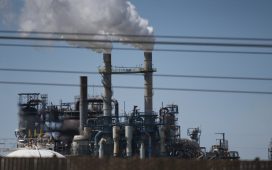Rising sea levels caused by climate change added $8 billion to cost of damages from Superstorm Sandy in 2012, according to new research published Tuesday in the journal Nature Communications.
Researchers determined that human-caused climate change had led to a nearly four-inch rise in sea levels, which contributed to 13 percent of the $62.5 billion in damages caused by the storm.
They estimated that the sea level rise resulted in up to 71,000 more people and 36,000 more housing units being exposed to flooding in Connecticut, New Jersey and New York.
“The potential influence of climate change on the storm itself has been debated, but sea level rise driven by anthropogenic climate change more clearly contributed to damages,” the study states.
“To quantify this effect, here we simulate water levels and damage both as they occurred and as they would have occurred across a range of lower sea levels corresponding to different estimates of attributable sea level rise.”
The calculations were based on the height of the storm surge above the Battery in Manhattan’s high tide line, which researchers put at 9 feet. Data indicated that worldwide, sea levels in 2012 were about 4.1 inches higher than in 1900, although levels in the New York area were slightly lower, at 3.8 inches.
The study adds that the additional $8 billion may not incorporate all economic effects of flooding causes by sea level rise, citing the difficulty of measuring their effects on long-term trends such as employment changes and industrial production changes.
“In most cases, flooding was made worse by sea level rise and we show how much worse,” study co-author Philip Orton, a physical oceanographer at New Jersey’s Stevens Institute of Technology, told The Associated Press.
He noted that in some affected areas, such as New York City, the rise in sea levels exacerbated flooding in housing like basement apartments.









